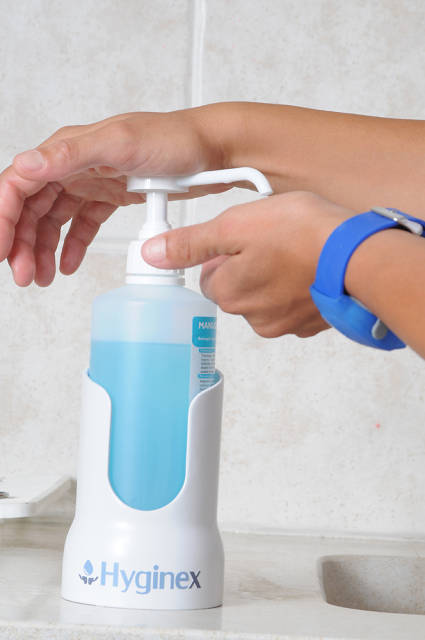www.fastcoexist.com
A Wristband To Force Doctors To Wash Their Hands, Save Lives
Hospital acquired infections are a costly and deadly problem, one that could be seriously mitigated if everyone was better about washing their hands. This new system, which alerts medical professionals if they haven’t done that, could help.
Hand hygiene is described as "the single most important factor in the prevention of health-care-acquired infections." But research shows that health workers have relatively low compliance to hand-cleansing messages, despite strongly worded signs in bathrooms, wards, and intensive care units.
One study of U.S. facilities found compliance at just 26% for ICUs and 36% for non-ICUs. It’s not just gross: Up to 1.7 million patients, or a fifth of all those admitted, pick up infections in hospitals annually. About 5% of those people die, and the increased costs to the system are up to $30 billion a year, according to the Centers for Disease Control and Prevention.

Given the costs, Efrat Raichman doesn’t see why we shouldn’t push harder to raise hand-washing rates--even if the system she’s developed could be seen as intrusive for health care workers.
Hyginex, developed in Israel, is an integrated soap-dispensing-and-wristband-alert system. When a doctor approaches a new patient, a nearby unit will sense his or her presence and send a signal, setting off first an LED light, then a vibration in the bracelet. The band also alerts workers if they haven’t washed well enough: The dispenser knows how much liquid has been taken, and has motion sensors that tell how long hands are rubbed together.
With dozens of sensor-dispensers around the hospitals, the system can also keep a detailed log of hand-cleaning compliance. At the end of the month, managers can review the figures to see how well the hospital is doing and make adjustments, if necessary.
"All the information is very visible to the staff. They can understand their compliance and the quality of the hand-washing," says Raichman, insisting Hyginex is not just another means of overbearing management control. "It’s a personal assistant for the staff. The doctors and nurses know they need to do this every time they’re treating a new patient, but they don’t always remember."
A two month trial in an ICU unit in Israel found that compliance rates rose from 25% to 44% after the Hyginex system was introduced. Another trial found that workers were washing their hands for longer and used more soap.
The doctors and nurses know they need to do this, but they don’t always remember.
Hyginex is already used in four Israeli hospitals, with three more on the way. The company also plans a rollout in the U.S. and Europe, though there are several competing systems that use badges instead of bands.
An electronic engineer and computer scientist, Raichman developed Hyginex after someone close to her died of a hospital infection. He had gone only in for minor issue.
"When I looked into it, I discovered that the main reason people get infections is the hand hygiene of the staff, and I thought, That’s unbelievable! It’s not the surgery. It’s poor hand hygiene."
Raichman isn’t particularly sympathetic to criticism that the band might be a distraction, or a bit annoying.
"Don’t you think it bugs us when someone dear to us goes to hospital and dies because a nurse doesn’t think?" she says. "And actually we’re not bugging them. It’s a light and a small vibration, just to remind them that they are dealing with my uncle, my mother, my brother."
FASTXOEXIST